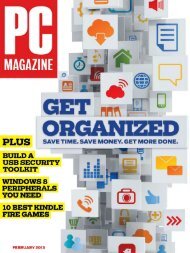et al.
et al.
et al.
You also want an ePaper? Increase the reach of your titles
YUMPU automatically turns print PDFs into web optimized ePapers that Google loves.
CREDITS: (TOP LEFT) TOM KOCHEL; (RIGHT) ISTOCKPHOTO.COM<br />
Bruce Alberts is Editorin-Chief<br />
of Science.<br />
Designing Scientifi c Me<strong>et</strong>ings<br />
EDITORIAL<br />
THIS ISSUE OF SCIENCE CONTAINS ANNOUNCEMENTS FOR MORE THAN 100 DIFFERENT GORDON<br />
Research Conferences, on topics that range from atomic physics to development<strong>al</strong> biology.<br />
The brainchild of Neil Gordon of Johns Hopkins University, these week-long me<strong>et</strong>ings are<br />
designed to promote intimate, inform<strong>al</strong> discussions of frontier science. Often confi ned to<br />
fewer than 125 attendees, they have tradition<strong>al</strong>ly been held in remote places with minim<strong>al</strong><br />
distractions. Beginning in the early 1960s, I attended the summer Nucleic Acids Gordon<br />
Conference in rur<strong>al</strong> New Hampshire, sharing austere dorm facilities in a private boys’ school<br />
with randomly assigned roommates. As a beginning scientist, I found the question period after<br />
each t<strong>al</strong>k especi<strong>al</strong>ly fascinating, providing v<strong>al</strong>uable insights into the person<strong>al</strong>ities and ways of<br />
thinking of many senior scientists whom I had not encountered previously. Back then, there<br />
were no cellphones and no Intern<strong>et</strong>, and <strong>al</strong>l of the speakers seemed to stay for the entire week.<br />
During the long, session-free afternoons, graduate students mingled<br />
freely with professors. Many lifelong friendships were begun, and—<br />
as Gordon intended—new scientifi c collaborations began. Leap forward<br />
to today, and every scientist can gain immediate access to a vast<br />
store of scientifi c thought and to millions of other scientists via the<br />
Intern<strong>et</strong>. Why, nevertheless, do in-person scientifi c me<strong>et</strong>ings remain<br />
so v<strong>al</strong>uable for a life in science?<br />
Part of the answer is that science works best when there is a deep<br />
mutu<strong>al</strong> trust and understanding b<strong>et</strong>ween the collaborators, which is<br />
hard to develop from a distance. But most important is the critic<strong>al</strong><br />
role that face-to-face scientifi c me<strong>et</strong>ings play in stimulating a random<br />
collision of ideas and approaches. The best new science occurs<br />
when someone combines the knowledge gained by other scientists<br />
in non-obvious ways to create a new understanding of how the world<br />
works. A successful scientist needs to deeply believe, whatever the<br />
problem being tackled, that there is <strong>al</strong>ways a b<strong>et</strong>ter way to approach that problem than the<br />
path currently being taken. The scientist is then constantly on the <strong>al</strong>ert for new paths to take<br />
in his or her work, which is essenti<strong>al</strong> for making breakthroughs. Thus, as much as possible,<br />
scientifi c me<strong>et</strong>ings should be designed to expose the attendees to ways of thinking and techniques<br />
that are different from the ones that they <strong>al</strong>ready know.<br />
There is a danger of scientifi c me<strong>et</strong>ings becoming overly speci<strong>al</strong>ized as the amount of scientifi<br />
c knowledge expands. There is no longer a Gordon Conference c<strong>al</strong>led Nucleic Acids;<br />
understandably, it was replaced long ago by a whole s<strong>et</strong> of me<strong>et</strong>ings on related subspeci<strong>al</strong>ties.<br />
But I would argue that one should try to avoid producing a scientifi c me<strong>et</strong>ing where<br />
<strong>al</strong>l of the attendees use the same approaches and read the same scientifi c literature. In fact,<br />
the most stimulating scientifi c me<strong>et</strong>ings that I have attended have taken the extreme opposite<br />
approach, intention<strong>al</strong>ly mixing scientists with very different backgrounds and interests,<br />
convening them to produce a s<strong>et</strong> of new ideas for attacking a ch<strong>al</strong>lenging scientifi c puzzle.<br />
One example of such a me<strong>et</strong>ing was an intensive 2-day 1995 workshop on schizophrenia<br />
that involved 18 carefully selected scientists, most of whom knew <strong>al</strong>most nothing about<br />
the disease. The me<strong>et</strong>ing began with a few invited experts presenting what was known about<br />
schizophrenia to the non-experts, answering their many questions in inform<strong>al</strong> discussions<br />
around a large square table. All of the remaining time was spent in brainstorming about possible<br />
new approaches to understanding the cellular basis for the disease and discovering b<strong>et</strong>ter<br />
treatments. In the process, we <strong>al</strong>l learned a great de<strong>al</strong> of new science, and we produced a report<br />
with v<strong>al</strong>uable new ideas.* This simply could not have happened via e-mail or Skype. A second,<br />
larger example is the Keck Futures Initiative, convened annu<strong>al</strong>ly by the U.S. Nation<strong>al</strong> Academies.<br />
Could more me<strong>et</strong>ings of this type play a powerful role in accelerating the scientifi c<br />
innovation needed to address the world’s many new ch<strong>al</strong>lenges?<br />
– Bruce Alberts<br />
10.1126/science.1236324<br />
*S. H. Barondes <strong>et</strong> <strong>al</strong>., Proc. Natl. Acad. Sci. U.S.A. 94, 1612 (1997). See www.keckfutures.org/about/index.html.<br />
www.sciencemag.org SCIENCE VOL 339 15 FEBRUARY 2013<br />
Published by AAAS<br />
737<br />
on February 14, 2013<br />
www.sciencemag.org<br />
Downloaded from





